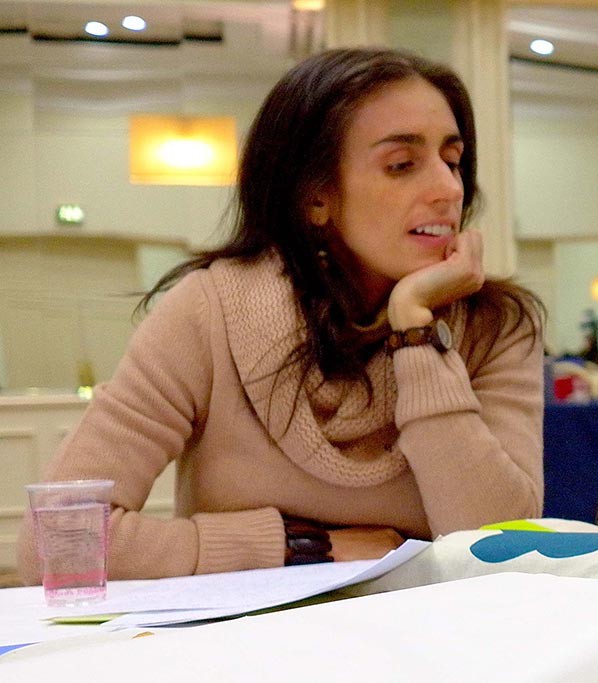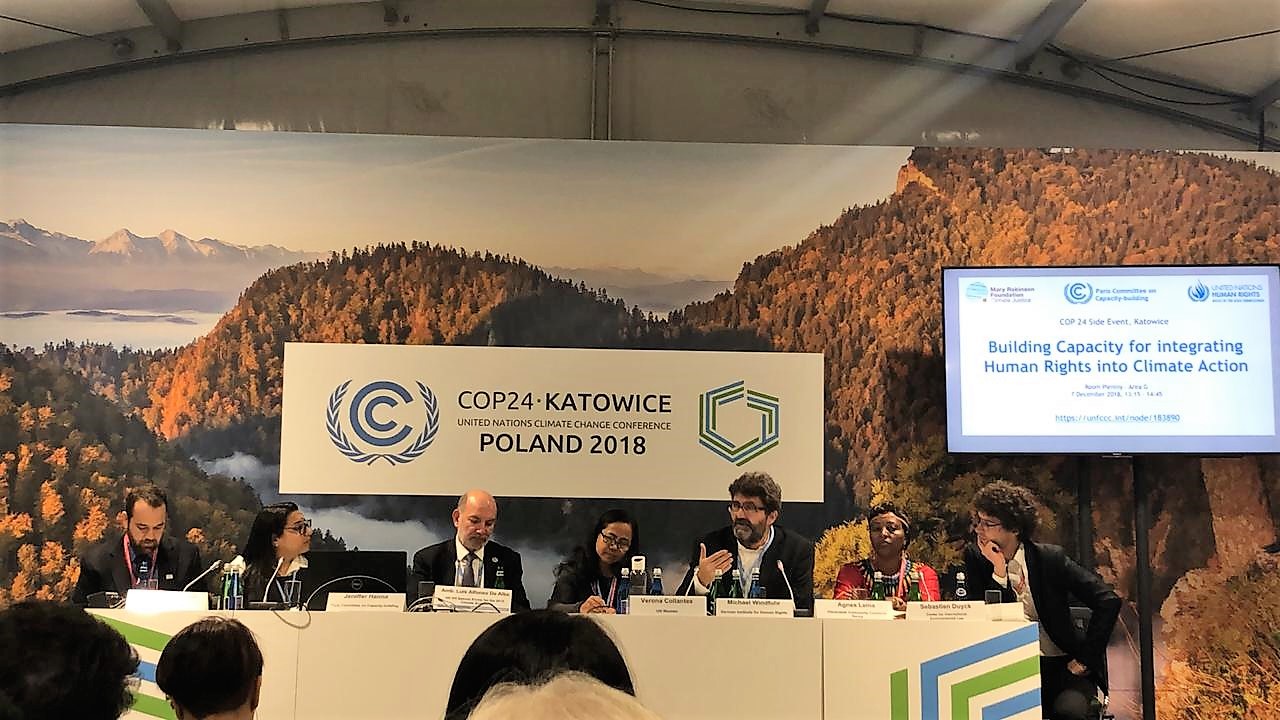This afternoon in Katowice at COP24, the Mary Robinson Foundation – Climate Justice co-hosted a joint side event of the Paris Committee on Capacity-building (PCCB) with the Office of the High-Commissioner for Human Rights (OHCHR) focused on building capacity for integrating human rights into climate action. Climate change experts were clear that human rights, and their relationship to climate change, constitutes a significant knowledge gap in expertise among those working on issues of climate action and called for a focal point on human rights to be appointed within the UNFCCC Secretariat.
The event, Building Capacity for the Integration of Human Rights into Climate Action, focused on the the process of developing and implementing nationally determined contributions (NDCs) that are consistent with human rights obligations. NDCs are the backbone of the Paris Agreement, the process through which countries set out the efforts they are going to make to reduce emissions and help their populations adapt to the impacts of climate change. It is of the upmost importance that these NDCs incorporate human rights so as to ensure that the consequent climate action doesn’t undermine peoples rights, but rather improves effectiveness and results in benefits for people and the planet.
The human rights implications of climate change and climate action have received greater focus in recent years. The Paris Agreement explicitly calls on countries to respect, promote and consider their human rights obligations when tackling climate change and the PCCB, established by the Paris Agreement, identifies human rights as a cross-cutting issue for its work.
The PCCB seeks to help countries to address current and emerging gaps and needs which they may encounter in in implementing the Paris Agreement. The PCCB is made up of twelve capacity-building experts who represent developed and developing countries. These experts have been tasked with managing and overseeing the capacity-building work plan up until 2020 and have an important role in ensuring coherence and coordination in capacity-building activities under the UNFCCC.
An important part of its work is the analysis of climate capacity-building issues and the development of sensible policy recommendations to support countries in enhancing climate action. The Mary Robinson Foundation – Climate Justice has been working with Parties to the UNFCCC to better understand what is required to ensure that climate action protects and delivers human rights. Thus, the Foundation proposes the development of a human rights focal point within the UNFCCC to assist Parties in ensuring climate action is consistent with their human rights obligations.
In her opening presentation, Tara Shine of the Mary Robinson Foundation Climate Justice highlighted the significant increase in the number of countries making the links between human rights and climate change in their reports to the UNFCCC and the Human Rights Council. In 2016, just 12 countries were found to be reporting on the linkages under both processes, but this number jumped to 31 by 2018. Tara Shine said “We need to build capacity on human rights and climate change now to inform NDC updates and implementation – the scale and pace of the action we need to take means we have to find solutions that are good for the climate and good for people.”
The subsequent panel conversation, Ambassador Luis Alfonso De Alba, UN SG Special Envoy for the 2019 Climate Summit, said “We need to get beyond integrating human rights to delivering human rights in climate action… …We need to promote the focal point among governments so they support it, including by providing finance.”
Verona Collantes, from UN Women, indicated that the consideration of gender issues in the climate negotiations was greatly assisted by the creation of the Gender Focal Point. She said “We can learn from how we have integrated gender equality into climate policies and actions to inform the steps on human rights. Having a gender focal point really helped us progress gender equality – a focal point on human rights could help to promote human rights in a similar way.
Addressing the room from the floor, Rita Mishaan, Ambassador of Climate Change, Ministry of Foreign Affairs of Guatemala said that she agreed with the proposal to create a Human Rights Focal Point. “The inclusion of human rights in the preamble is not enough,” she said, “we need to put the issue at the centre of the conversation to achieve climate justice.”
Finally, Agnes Leina, Executive Director, Illaramatak Community Concerns, Kenya, impressed upon the gathered audience the importance of respecting the rights of indigenous people, saying “Human rights have been ignored in the UNFCCC to date. The transition to renewable energy has caused a lot of damage to indigenous communities. This is happening all over the world. Indigenous people have been displaced so that a clean energy project can be built. We need a focal point in the UNFCCC on human rights and one on indigenous people to protect our rights.”
Related Links
Our work on Human Rights and Climate Change


